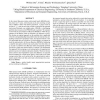Free Online Productivity Tools
i2Speak
i2Symbol
i2OCR
iTex2Img
iWeb2Print
iWeb2Shot
i2Type
iPdf2Split
iPdf2Merge
i2Bopomofo
i2Arabic
i2Style
i2Image
i2PDF
iLatex2Rtf
Sci2ools
133
click to vote
CORR
2010
Springer
2010
Springer
The Non-Bayesian Restless Multi-Armed Bandit: a Case of Near-Logarithmic Regret
In the classic Bayesian restless multi-armed bandit (RMAB) problem, there are N arms, with rewards on all arms evolving at each time as Markov chains with known parameters. A player seeks to activate K 1 arms at each time in order to maximize the expected total reward obtained over multiple plays. RMAB is a challenging problem that is known to be PSPACE-hard in general. We consider in this work the even harder non-Bayesian RMAB, in which the parameters of the Markov chain are assumed to be unknown a priori. We develop an original approach to this problem that is applicable when the corresponding Bayesian problem has the structure that, depending on the known parameter values, the optimal solution is one of a prescribed finite set of policies. In such settings, we propose to learn the optimal policy for the non-Bayesian RMAB by employing a suitable meta-policy which treats each policy from this finite set as an arm in a different non-Bayesian multi-armed bandit problem for which a sin...
CORR 2010 | Education | Markov Chain | Policy | RMAB |
| Added | 22 Mar 2011 |
| Updated | 22 Mar 2011 |
| Type | Journal |
| Year | 2010 |
| Where | CORR |
| Authors | Wenhan Dai, Yi Gai, Bhaskar Krishnamachari, Qing Zhao |
Comments (0)

